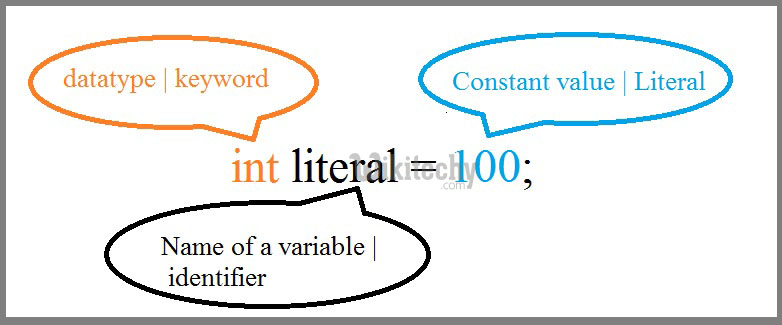
Constants can be of any of the basic data types and can be divided into Integer literals, Floating-Point literals, Strings, Characters and Boolean Values.
Integer literals
An Integer literal can be a decimal, octal, or hexadecimal constant.
A prefix specifies the base or radix: 0x or 0X for hexadecimal, 0 for octal, and nothing for decimal.
Example
45 //decimal
0213 //octal
0x4b //hexadecimal
Floating-point literals
A floating-point literal has an integer part, a decimal point, a fractional part, and an exponent part. You can represent floating point literals either in decimal form or exponential form.
Example
3.14159
314159E-5L
Boolean literals
There are two Boolean literals and they are part of standard C++ keywords:
A value of true representing true.
? A value of false representing false.
You should not consider the value of true equal to 1 and value of false equal to 0.
Character literals
A character literal can be a plain character (e.g., 'x'), an escape sequence (e.g., '\t'), or a universal character (e.g., '\u02C0').
Escape sequence & Meaning
  There are several character escape sequences which can be used in place of a character constant or within a string.
\a alert (bell)
\b backspace
\f formfeed
\n newline
\r carriage return
\t tab
\v vertical tab
\ backslash
\? question mark
\' quote
\'' double quote
\ooo character specified as an octal number
\xhh character specified in hexadecimal
String literals
String literals are enclosed in double quotes. A string contains characters that are similar to character literals: plain characters, escape sequences, and universal characters.
You can break a long line into multiple lines using string literals and separate them using whitespaces.
Here are some examples of string literals. All the three forms are identical strings.
"hello, dear"
"hello, \
dear"
"hello, ""d""ear"
Defining Constants
There are two ways in C++ to define constants:
* Using #define preprocessor.
* Using const keyword.
The #define Preprocessor:
Following is the form to use #define preprocessor to define a constant:
#define identifier value
Example:
#include <iostream>
using namespace std;
#define WIDTH 5
#define LENGTH 10
The const Keyword: You can use const prefix to declare constants with a specific type as follows:
const type variable = value;
Example:
#include<iostream>
using namespace std;
int main()
{
const int LENGTH =10;
const int WIDTH =5;
}
3.4 Variable Storage Classes NEXT >>